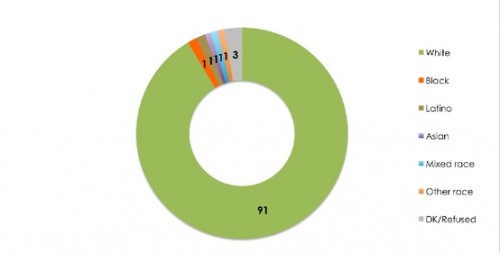American divisions over the state of our country’s race relations were brought to the forefront in the aftermath of Mike Brown’s shooting by a Ferguson, MO police officer named Darren Wilson. Black Americans are more than twice as likely as whites or Hispanics to say that the killing was part of a broader pattern (source). And blacks are twice as likely as whites to say that race played an important role in Wilson’s decision to shoot (source).
At The Atlantic, Robert Jones argues that these disparate opinions may be caused, in part, by the different life experiences of the typical white and black American. He shows data, from the American Values Survey, indicating that black people are much more likely than whites to report living in communities rife with problems, from a lack of jobs and inadequate school funding to crime and racial tension.
In the meantime, whites may be genuinely naive about what it’s like to be black in America because many of them don’t know any black people. According to the survey, the average white American’s social network is only 1% black. Three-quarters of white Americans haven’t had a meaningful conversation with a single non-white person in the last six months.
In contrast, the social network of the average black American is 65% black and, among Hispanic Americans, 46% Hispanic.
The average white person’s failure to engage meaningfully with people of color isn’t solely a matter of personal choice, though that is certainly part of it. Nor is it simply a function of the country being majority white, non-Hispanic (but not for long). White insularity is caused, too, by occupational and residential segregation which, in turn, is the result of both individual choices and institutionalized mechanisms that keep black people in poverty and prison.
If we want the people of America to embrace justice, we must make our institutions just.
Cross-posted at Pacific Standard.
Lisa Wade, PhD is an Associate Professor at Tulane University. She is the author of American Hookup, a book about college sexual culture; a textbook about gender; and a forthcoming introductory text: Terrible Magnificent Sociology. You can follow her on Twitter and Instagram.


